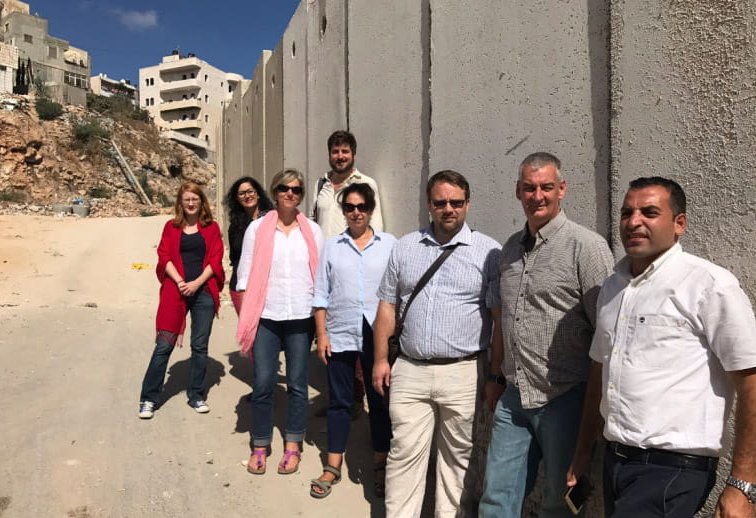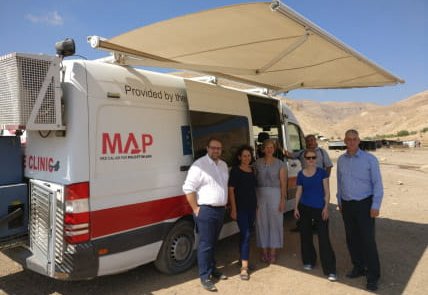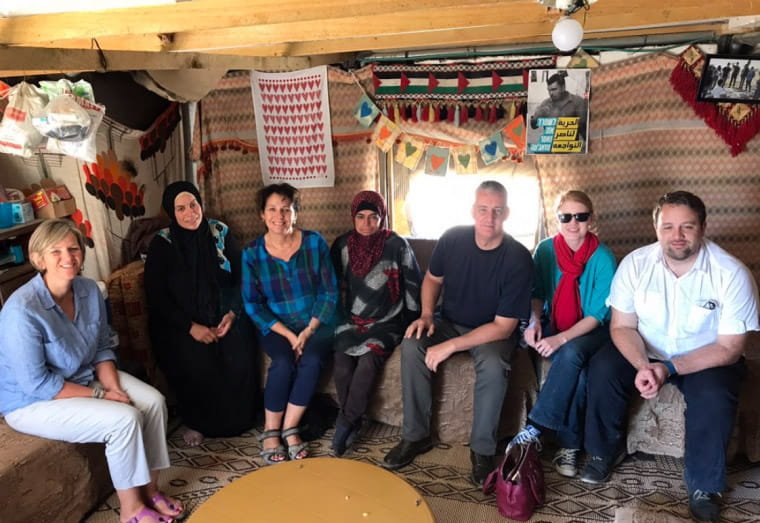MPs witness barriers to health and dignity in the West Bank

Communities under threat

The delegation’s other visits included the community of Susiya in the South Hebron Hills with Breaking the Silence – an Israeli NGO formed of former Israeli soldiers who speak out against the occupation – and the village of Khan al Ahmar with another Israeli Human Rights NGO, B’Tselem. Both communities are threatened with imminent demolition and displacement under Israeli government plans which B’Tselem recently warned in a letter to Israeli Prime Minister Benjamin Netanyahu and other senior Israeli ministers would “constitute a war crime carried out at [their] instruction and under [their] personal responsibility.”
Health Under Occupation
At the Qalandia Checkpoint, the major crossing point from the occupied West Bank to illegally-annexed East Jerusalem, they met Mohamed Fityani, the young paramedic working with the Palestine Red Crescent Society who was featured in MAP’s ‘Health Under Occupation’ documentary earlier this year. He described the process of delay-causing ‘back-to-back’ transfers patients are forced to endure when going through the checkpoint: getting out of a Palestinian-registered ambulance and into an Israeli-registered one, even in emergency situations.
At Al Makassed Hospital in East Jerusalem, the MPs heard from Director Dr Rafiq Husseini, clinicians, and staff from Physicians for Human Rights – Israel about how Israel’s permit system and barriers to free movement limit patients’ access to care and clinicians’ ability to travel from Gaza and the West Bank to attend training and residencies at the hospital. They also saw the impact of Israeli security forces’ raids on the hospital in July this year.

Children in military detention
The MPs witnessed the workings of Israel’s military court system at Ofer Prison, alongside NGO Military Court Watch. Access had been pre-arranged to the courts, but the delegation was twice forced to leave the trials they were observing due to a variety of reasons expressed by the court guards, not all of them consistent or seemingly legitimate, including: the use of secret evidence; the presence of a child detainee; a lack of permission from the defendant’s family; or overcrowding in the viewing area. The MPs were nevertheless able to speak to families and defendants, family members and attorneys about some of the cases that day, which included attempted stabbings, stone throwing, online ‘incitement’, crossing into East Jerusalem without a permit, and traffic offenses.
One man told the group that he was attending the first hearing of his 15-year-old son who had been arrested while trying to pick up some suits from a tailor while another group of Palestinian youths were throwing stones nearby. One woman from the village of Biddu, who was waiting for the trial of her 17-year-old son, said he was accused of throwing stones, and that her other sons had been jailed for raising the Palestinian flag at a protest. She told the group that her house had since been raided several times by Israeli forces. “Imagine what they do to those accused of serious crimes!” she said.
Palestinians pursuing change
Among the other briefings attended by the MPs were meetings with PLO Executive Committee Member Dr Hanan Ashrawi, the UN Office for the Coordination of Humanitarian Affairs, the Tent of Nations, and local representatives of NGOs Amnesty International, Human Rights Watch, Gisha and Al Haq.
The delegates learned of the vital work being done by Palestinian civil society to pursue rights, freedoms and development in these challenging circumstances. Over dinner in the Bedouin community of ‘Arab al-Jahalin, Hamda Salem, President of the Jahalin Women’s Association, described how their collective of young women had combined their efforts and resources to provide education, advice and activities for mothers and children from the community, much of it made possible through the support of the Dalia Association. One community member expressed their hope that the Parliamentarians would continue to highlight the challenges posed by life under occupation on their return to the UK:
“We are pleased to welcome you, and hope our voices will reach the British Parliament”.

